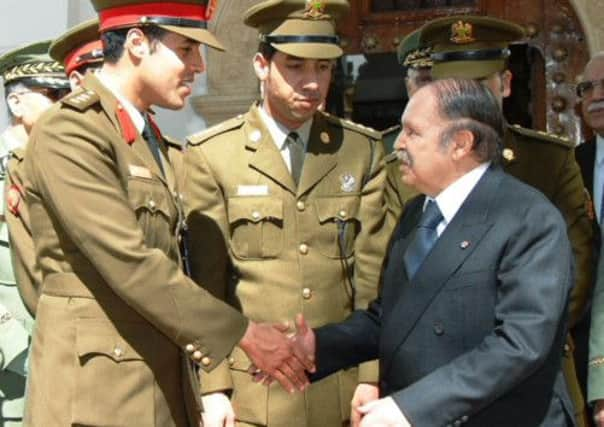Speculation over Algerian president Bouteflika


In a country run with Soviet-style secrecy, nobody is sure how sick Mr Bouteflika is. But despite an official bulletin last week saying he was recovering from a minor stroke, most believe the 76-year-old must be seriously ill to have disappeared from public view for so long.
France’s Le Point magazine cited medical sources this weekend as saying some of his vital organs had been badly affected. Algerian newspaper editor Hichem Aboud said that, according to his sources, Mr Bouteflika – who survived cancer in 2005 – was in a deep coma. French and Algerian officials declined to comment but local media have hinted that the country is preparing for a new era.
Advertisement
Hide AdAdvertisement
Hide AdThe loss of Mr Bouteflika would deprive Algeria of the last of the old guard who steered the country from independence in 1962 through civil war against Islamist insurgents in the 1990s to a period of stability funded by vast oil and gas resources.
It might also lead to a bumpy transfer of power before presidential elections due in April 2014 at a time when Algeria’s neighbours – among them Mali, Tunisia and Libya – are facing a revival of Islamist militancy in the region.
Algeria experienced that militancy in January when gunmen from al-Qaeda in the Islamic Maghreb (AQIM) attacked a gas plant in the south, killing 38 people, including foreign hostages.
But Mr Bouteflika’s passing would not plunge Africa’s largest country into crisis. A paternalistic state apparatus which includes a secretive military-intelligence establishment is trusted to manage the transition by a population too scarred by the 1990s to risk a return to conflict. Algeria also has £132 billion in foreign exchange reserves to buy off protesters if needed.
“Algeria is not based on individuals; it is based on institutions,” said one Algerian security expert. “Algeria will be stable, even with Bouteflika gone.”
Nobody is even sure where Mr Bouteflika is. Some say he is still in France’s Val-de-Grace military hospital, others that he has gone to Switzerland. Mr Aboud, the newspaper editor, said he had already been brought back to Algeria.
“I don’t think there will be instability. There are no actors who could lead such instability,” he said.
He added: “And Algerians are also tired after ten years of terrorism [in the 1990s].”